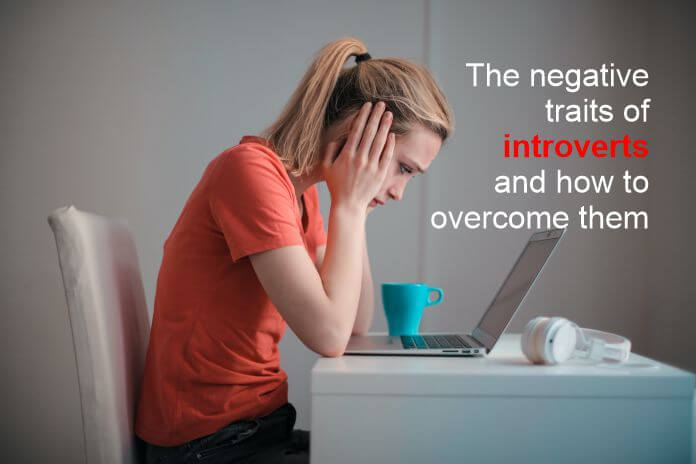Discover the negative traits of introverts and how they overcome the challenges of overthinking, socializing, conflict avoidance, and being misunderstood.
Even with their quiet, harmless, and calm personalities, there are negative traits of introverts that make them unattractive and also make people uncomfortable around them.
As an introvert myself, I know how frustrating it is for people when they find me interesting and want to get closer but I deliberately but respectfully do not give them the opportunity.
I do not want to engage with people in small talk or engage in loud laughter because I do not allocate energy for such.
This might be one of the bad habits of introverts, but they have to look out for themselves and what makes them happy.
Also, I know how bad it feels for an introvert to be called up to deliver a speech or address an audience. He would want to decline if he could.
In this article, we have listed 18 negative traits of introverts that make them who they are.
Related: What Are The Strengths And Weaknesses Of Introverts?
Bad habits of introverts make things difficult for themselves and others

Discerning introverts know they make things difficult for people and also for themselves, but sometimes they can’t help it.
Though they do this effortlessly, they sometimes don’t know how to be different because that’s what they feel comfortable doing.
However, being emotionally intelligent makes the difference because you will know when your attitude is hurting others.
If I get these vibes from my fellow introverts, I give them reasonable space for them to be comfortable because I relate.
If you are an introvert, these scenarios would be very familiar to you, and if you are not one, you must have encountered one who to you seemed weird.
As an introvert all my life, I am in a good position to point out a few negative traits of introverts and how they can ease up to make things easier for themselves and others.
Negative traits of introverts

As a personality type who does not like the crowd or being noticed, introverts are seen as weak.
That’s not the case, they know what they are doing.
You will know how wild an introvert could be when he is comfortable with you, and that’s a privilege to you lol.
They are extra outgoing in their comfort zone.
Here are the negative traits of introverts you might find annoying:
1. Uncommunicative/shutting people out
This is the most noticeable bad habit of an introvert when you are up close, trying to get familiar.
Most times, it would be a hard task to get introverts talking.
While finding your way around them for any reason, it is frustrating when they reveal little or no information at all.
Why introverts do this might not be the same across the board, but the feeling it elicits from people is the same: contempt and frustration.
How to be communicative as an introvert
- Believe in yourself
- Practice communication in your closet
- You can speak without revealing much
- Know when your attitude is hurting others
- Even if you can’t speak much, at least give the audience
2. Introverts hardly reach out to friends and well-wishers

One of the widespread negative traits of introverts is not reaching out to friends and well-wishers to check on them.
I remember my cousins and aunties always complaining that I don’t check on them.
They are always the ones reaching out, no matter how long, and I will promise to keep in touch and will never do so until they reach out again.
The reason for this behavior is not that I don’t remember them or think about them, but sheer reluctance occasioned by avoiding too much small talk.
How to form the habit of reaching out to friends and well-wishers
- Understand you are not an island and so need to keep in touch with your close cycle
- Be deliberate, and overcome the boring feeling that comes with talking to people
- Age has a lot to do with introversion, older people tend to overcome their negative introvert traits
3. Some introverts are snobbish

Another negative trait of introverts is being snobbish. As a discerning introvert, I can be naturally snobbish and unwelcoming.
Not because I hate the next person, but because I don’t need a distraction or not ready to have someone in my space at that particular time.
Related: How do I know if I am An introvert? 17 Sure Signs
It does not have to do with the person I am snubbing; rather, they are just unfortunate to be in my space at that moment.
Here are a few ways to avoid people respectfully without appearing like a snob.
- Know that everybody deserves respect, no matter how lowly
- If you are in a hurry or don’t want to engage with people, decline politely and give reasons, even though you don’t owe anybody that
- Evaluate the reasons why you snub if they are worth it
4. Introverts seldom honor invitations

One of the strongest negative traits of introverts is their penchant to not honor events. They usually find reasons why they couldn’t attend.
I can relate to this because I detested going to weddings, funerals, and other public events that would require me to sit down for hours.
Introverts find this boring and energy-sapping. However, they attend when it is inevitable and would ruin their reputation.
Tips to help you honor invitations
- See events as a means to network rather than what it is
- When you honor people’s events, they will honor yours
- You can go earlier and let the celebrant see you, and then leave
5. Fear of taking risks
Fear of risk is another bad habit of introverts. Some introverts prefer their comfort zone to stepping into unfamiliar terrain. They would rather make do with the certain than venture into the uncertain.
This is mostly a result of failure or judgment by people. This might save them from danger, but it also shuts them out of wins that are embedded in spontaneous ventures.
Failure, disappointments, and judgmental people are all parts of life that we should not run away from.
Tips on taking risks as an introvert
- Overcome the fear of failure
- Focus on the gain
- Weight the possible results of risks
6. Overly sensitive
Introverts are very sensitive people who analyze every situation and how it affects them.
No doubt, being sensitive can have some benefits including having a very rich inner life and empathy.
But it doesn’t go without its stress, anxiety, and relationship challenges, including inappropriate emotional responses to situations and difficulty adapting to new circumstances.
Tips on how to handle sensitivity
- Have your own space – house, office, tools, etc
- Identify and avoid things that trigger your emotions
- Be self-aware
Also Read: The Pitfalls Of An Abrasive Personality
7. Introverts don’t ask for help
Introverts have the bad habit of not asking for help and trying to do everything by themselves.
This is partly because they don’t so much as ask for help from them, and so they find it difficult to ask for help.
They try to single-handedly achieve whatever they set their minds on. This makes the task stressful and bulky for them, especially when they are not familiar with the task.
It would consume their time, thinking, and other resources, which would be minimal if they had extra hands.
Tips on asking for help
- First of all, know and accept you can’t do everything
- Seek collaboration
- Understand that people would be willing to help
- If it warrants hiring someone, do so
8. Overthinking and too much analysis
Another bad habit of the introvert is too much overthinking and analyzing situations and things. This happens because of their oversensitivity.
An introvert will take their time to scrutinize to make sure everything is in order. While this is not bad, it should not be a hindrance to growth and progress.
Sometimes, this wastes time and prevents strategic actions because you must not figure everything out before taking a step.
Tips on preventing too much overthinking and analysis
- While you shouldn’t jump to conclusions, understand the benefits of time
- Study the situation before the crucial time
- Identify low-priority issues and don’t give them much attention
- Minimize too much thinking and handle issues as they come
Related: Embracing Introversion In An Extroverted World
9. Delay in taking action/decision
Another negative trait of introverts is being slow in taking action or making decisions.
Just as they analyze too much, it culminates in taking so much time to decide on which step to take.
This could be beneficial in some cases where a critical decision is involved, but it could also be a problem when it is time-bound.
Tips on how to overcome delays in taking action
- Always be conscious of time
- Look for the right data that can speed up analysis and decision
- Remove any emotional attachments and think clearly
- Look for enough information that would speed up the action
10. Haughtiness/bloated superiority
To be haughty means to feel and act arrogantly superior to others. Some introverts are misunderstood to be haughty when actually, they do not want to small-talk or when they need to be alone to recharge.
However, you are likelier to find haughty people amid introverts than elsewhere.
Because most introverts are satisfied with themselves and don’t seek help, they look down on others.
This is relatable to me because I am one and understand this perfectly. However, maturity takes care of this in most introverted people.
Tips on overcoming haughtiness
- Do not judge people
- Put yourself in their shoes
- Respect people irrespective of status
- Understand that everyone has some value
11. Envy extroverts when they are getting the attention
The outgoing nature of extroverts makes them the life of the party and able to interact with people. They don’t find it difficult to mix up and make friends.
This hurts most introverts, and they nurse envy and contempt for the extrovert. The proverbial – “hate what you can’t have.”
This envy howeve,r finds a way to show itself in the attitude of the introvert toward the outgoing extrovert.
Tips on controlling envy of the extrovert
- Respect differences
- Focus on your strengths, the extrovert has weaknesses, too
- Cultivate love and friendliness in your heart
- You can also gain attention as an introvert by standing out in your skills
12. Averse to teamwork
Introverts believe working solo makes them more creative and result-oriented.
They also think that working as a team brings about conflicts, drama, and arguments, which he is not ready for.
Teamwork saps their energy which results in a bland and unproductive workflow.
This makes them reclusive without having reasonable input as they only drift along.
Tips on how to overcome being averse to teamwork
- Accepting that you can’t avoid people and working with them is the first step to overcoming your aversion to people.
- Look at the benefits of working with people instead of the downsides
- Approach teamwork with a positive attitude
- Concentrate on making an input toward the targeted result
13. Bottled-up emotions
Introverts don’t always forget and forget. This is because they hardly handle issues decisively as they happen. For instance, they hardly speak up when they are hurt.
They would rather keep it to themselves and get their pound of flesh when they feel they can.
This is bad both for health and for socialization. Having hurtful feelings welling up inside without any way to release them is damaging to mental well-being, just as it is bad for relationships.
Though it can be difficult for introverts to engage in confrontations, it is good to let people know how bad you feel about their behavior. It helps in releasing hurtful emotions and feeling better.
Overcoming bottled-up emotions
- Speak up, it helps people know how to treat you
- Do not see people as antagonists or rivals; see them from the perspective of brotherhood
- Show anger and other emotions respectfully
- Talk to a therapist
14. Identity loss
Introverts can easily lose their identity by blending into the personality of people around them through empathy.
Because introverted people are sensitive, they take in the emotions and feelings of people and mirror them.
Through consistency, introverts can lose their personality and identity, reflecting those of others.
How to avoid identity loss by introverts
- Establish appropriate boundaries for your empathy
- Avoid getting unnecessarily emotional
- Always allow your identity to shine through in every situation
15. Feeling overwhelmed in social settings
Introverts often feel overwhelmed in social gatherings due to the immense stimulation that can drain their energy.
To overcome this, gradually expose yourself to social situations, practice active listening, and engage in deep conversations with individuals who share similar interests.
16. Difficulty initiating conversations
Introverts may find it challenging to start a conversation, fearing rejection or not having much to say.
To overcome this, prepare open-ended questions in advance, focus on showing interest in others, and practice active listening to create a supportive environment for communication.
17. Fear of public speaking
Public speaking can be particularly daunting for introverts, who may feel anxious about being the center of attention.
To overcome this, adopt techniques such as rehearsal, visualizing success, focusing on the message, and joining public speaking clubs or workshops to build confidence gradually.
18. Struggles with small talk
Introverts might find small talk challenging as it feels superficial and lacks depth.
However, small talk serves as a gateway to deeper connections.
Cultivate the art of small talk by focusing on shared interests, being a good listener, and asking open-ended questions to foster meaningful conversations.
How Introverts Can Overcome Their Perceived Negative Habits
As an introvert, you can improve your personal and professional life by working on certain areas.
Here are a few strategies that you can use to overcome some of your perceived negative traits and excel in various situations:
- Overcoming and managing the negative habits of introverts begins with self-awareness and acceptance. You must recognize and embrace your introverted nature without judgment or self-criticism.
- Embrace solitude and introspection. By acknowledging your natural inclination towards solitude and introspection, you can better understand your own needs and preferences.
- Understanding and accepting introversion, recognizing its strengths, and leveraging them, rather than trying to fit into extroverted norms.
- Stepping out of your comfort zone, challenging yourself in uncomfortable situations, and celebrating achievements along the way.
- Developing social skills by practicing active listening, initiating conversations, and asserting yourself when needed to establish meaningful connections.
- Communicating and prioritizing personal time for solitude and reflection to find the right balance between social interactions and solitary activities.
- Opting for smaller, more intimate networking settings and joining groups with common interests to build genuine connections.
- Utilizing written communication platforms to express thoughts comfortably, contribute to discussions, and build professional networks.
- Developing assertiveness skills to confidently express your thoughts and opinions, ensuring ideas are heard and valued.
- As an introvert, you possess qualities such as deep thinking, empathy, and strong observation skills. Recognizing these strengths can boost self-confidence and help you appreciate the unique perspective you bring to various situations.
- At the same time, you need to acknowledge the limitations that come with your introverted nature. This includes recognizing potential challenges in socializing, networking, and dealing with conflict.
By understanding these limitations, you as an introvert, can develop strategies to navigate these situations more effectively.
Frequently Asked Questions
What do introverts struggle with?
Introverts often struggle with socializing in large groups, networking, and maintaining a balance between solitude and social interaction.
What are the negative traits of introverts?
Negative traits of introverts can include overthinking, difficulty in socializing, conflict avoidance, and being misunderstood as aloof or unfriendly.
Do introverts get jealous?
Introverts, like anyone else, can experience jealousy, but it is not a trait specific to introversion. Jealousy can be felt by individuals of any personality type.
Why do introverts tend to overthink and get stuck in analysis paralysis?
Introverts often have a rich inner world and prefer to think deeply before acting, but setting time limits and seeking external perspectives can help overcome this habit.
Is it normal for introverts to avoid social situations and isolate themselves?
Yes, introverts recharge by spending time alone, but excessive isolation can be detrimental. Finding a balance between solitude and socializing is important for overall well-being.
How can introverts break the habit of bottling up emotions and avoiding confrontation?
Developing assertiveness skills, practicing open communication, and finding healthy outlets for expressing emotions can help introverts navigate conflicts and maintain healthy relationships.
Conclusion
The negative traits of introverts might not be loud and noticeable, but they can do damage to them unwittingly.
However, the dark side of the introverted is just a single dimension of their lives, and there is more to them than their negative traits.
However, it is in good taste not to let these dark sides be a major impediment to enjoying life with others.
By identifying with the negative habits of introverts above, you would be able to control or deliberately avoid them and become a pure introvert.
References
Pious Clements is the insightful voice behind "The Conducts of Life" blog, where he writes about life ethics, self-development, life mastery, and the dynamics of people and society.
With a profound understanding of human behaviuor and societal dynamics, Pious offers thought-provoking perspectives on ethical living and personal growth.
Through engaging narratives and astute observations, he inspires readers to navigate life's complexities with wisdom and integrity, encouraging a deeper understanding of the human experience and our place within society.
